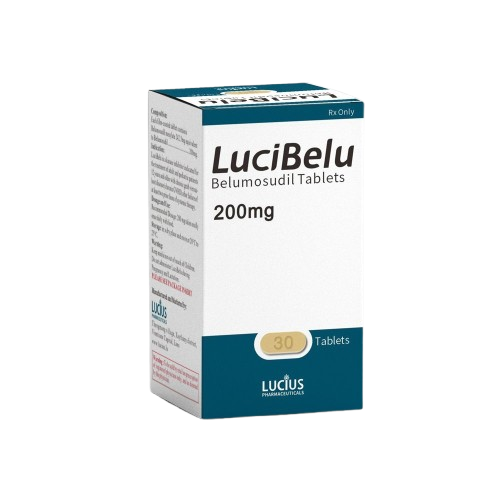Belumosudil, marketed under the brand name LuciBelu 200 mg, is a selective inhibitor of Rho-associated coiled-coil kinase 2 (ROCK2). It is primarily indicated for the treatment of chronic graft-versus-host disease (cGVHD), a complication that can occur after allogeneic stem cell or bone marrow transplantation. Belumosudil offers a novel therapeutic approach by modulating both inflammatory and fibrotic processes associated with cGVHD.
What is Belumosudil?
Belumosudil is an oral medication that specifically targets and inhibits ROCK2, a kinase involved in various cellular processes, including inflammation and fibrosis. By selectively inhibiting ROCK2, LuciBelu 200 mg helps restore immune homeostasis and reduce tissue scarring in patients with cGVHD.
Mechanism of Action
Chronic inflammation and fibrosis are caused by the immune system becoming overactive in cGVHD. ROCK2 is essential to these processes because it:
- promoting pro-inflammatory T-helper cell activation (Th17 and T follicular helper cells).
- Increasing the production of pro-inflammatory cytokines.
- Promoting the differentiation of regulatory T cells (Tregs), which are essential for immune regulation.
- Facilitating the activation of profibrotic pathways, leading to tissue scarring.
- By inhibiting ROCK2, Belumosudil decreases the activation of these pathways, thereby reducing inflammation and fibrosis associated with cGVHD.
How to Use / Indications
Adults and children 12 years of age and older with chronic graft-versus-host disease (cGVHD) are the target population for LuciBelu 200 mg. It is applied when other systemic medications are ineffective in treating the illness.
Dosage and How to Take It
It is recommended to take 200 mg of Belumosudil orally once a day with food. Instead of chewing or fracturing the tablet, patients should drink it whole. Instead of taking additional doses to make up missed doses, patients should take the missed dose as soon as they remember on the same day.
Other Dosage Considerations
- Hepatic Impairment: No dosage adjustment is recommended for patients with mild hepatic impairment (Child-Pugh Class A). However,Belumosudil should be avoided in patients with moderate or severe hepatic impairment (Child-Pugh Class B or C) without liver involvement from cGVHD.
- Renal Impairment: The safety and efficacy of LuciBelu 200 mg in patients with severe renal impairment have not been established. There is no need to change the dosage for people with mild to moderate renal impairment.
- Drug Interactions: Concomitant use with strong CYP3A inducers or proton pump inhibitors may increase the clearance of Belumosudil. The dosage may need to be changed in these situations.
Side Effects
Common side effects :
- Infection
- Fatigue or weakness
- Nausea and diarrhea
- Shortness of breath and cough
- Swelling and bleeding
- Abdominal pain
- Muscle or bone pain
- Headache
- High blood pressure
Storage
LuciBelu 200 mg tablets should be stored in their original container at room temperature, between 20°C to 25°C (68°F to 77°F). To keep the tablets dry, the container should be sealed tightly. Patients should keep the medication out of reach of children and dispose of any unused tablets properly.
Benefits
The primary benefit of LuciBelu 200 mg is its ability to modulate both the inflammatory and fibrotic processes associated with cGVHD. By selectively inhibiting ROCK2, Belumosudil helps reduce tissue damage, improve organ function, and enhance the quality of life for patients with this debilitating condition.
Prescription
LuciBelu 200 mg is a prescription medication and should only be used under the supervision of a healthcare provider experienced in the management of cGVHD. Before initiating treatment, healthcare providers should assess the patient’s medical history, including liver and renal function, and consider potential drug interactions.
Interactions
LuciBelu 200 mg may interact with other medications, including:
- CYP3A Inhibitors: May increase the serum concentration of LuciBelu 200 mg.
- CYP3A Inducers: May decrease the serum concentration of LuciBelu 200 mg.
- Proton Pump Inhibitors: May alter the absorption of LuciBelu 200 mg.
- In order to evaluate possible interactions, patients should disclose any medications they are taking to their healthcare provider.
FAQs
Can LuciBelu 200 mg be used in pediatric patients?
Yes, it’s approved for patients aged 12 years and older with cGVHD.
Is LuciBelu 200 mg safe during pregnancy?
No, it may cause fetal harm; effective contraception is required.
Does it interact with other drugs?
Yes, especially with CYP3A modifiers and proton pump inhibitors.
How soon can I expect results?
Clinical improvements may be seen within weeks, but vary by individual.
Is it taken with or without food?
It should be taken with food for optimal absorption.
What are common side effects?
Fatigue, nausea, diarrhea, infections, and muscle pain are common.
Is a prescription required?
Yes, it must be prescribed and monitored by a healthcare provider.
conclusion
LuciBelu 200 mg (Belumosudil) represents a significant advancement in the treatment of chronic graft-versus-host disease (cGVHD), particularly for patients who have not responded to prior systemic therapies. By selectively inhibiting ROCK2, this medication targets key inflammatory and fibrotic pathways, addressing both the immune dysregulation and tissue scarring that characterize cGVHD.
Its once-daily oral dosing offers convenience, and its targeted mechanism provides a novel therapeutic option with manageable side effects for most patients. However, it is essential that Belumosudil be prescribed and monitored by healthcare professionals familiar with cGVHD due to potential drug interactions and organ-specific considerations.
In summary, Belumosudil offers meaningful benefits in a condition that can be debilitating and difficult to treat. Continued monitoring and research will help further define its role in broader patient populations and long-term outcomes.

